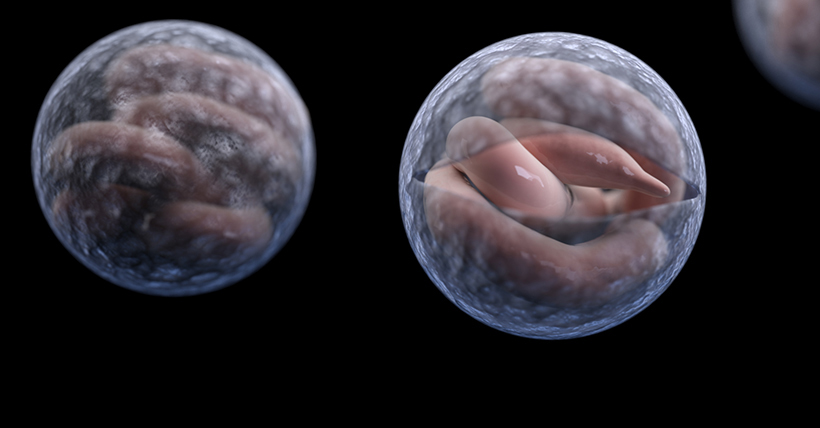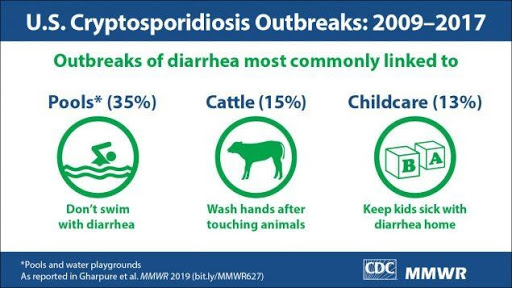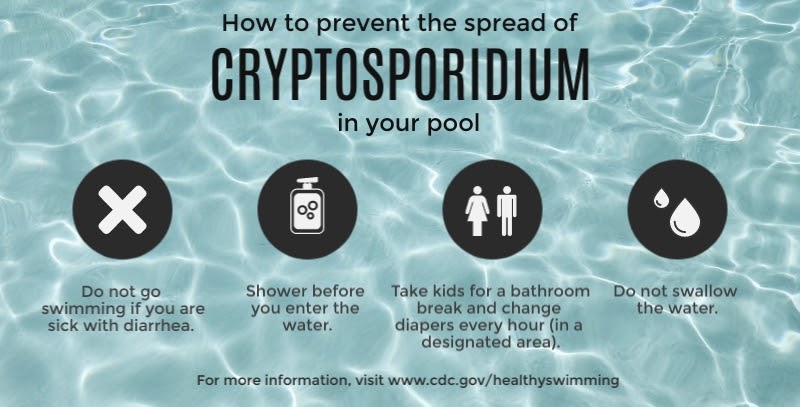What is Cryptosporidium?

Cryptosporidium is a parasite that causes cryptosporidiosis. It is caused by swallowing food or water that is contaminated with cryptosporidium or by having contact with people who have crypto or their environment. This germ is the leading cause of waterborne disease outbreaks. The most common symptom of “crypto” is watery diarrhea. However, it can also cause stomach cramps or pain, dehydration, nausea, vomiting, fever, weight loss, or no symptoms at all. If present, symptoms typically begin 2 to 10 days after infection. In people with healthy immune systems, symptoms generally last one to two weeks, but can come and go for up to 30 days. If you have been diagnosed with Crypto, stay out of the water for an additional two weeks after diarrhea stops.
Typically, symptoms resolve on their own. However, people with compromised immune systems may experience more severe and prolonged illness, and may require treatment by their doctor. Anyone with diarrhea, especially young children and pregnant women, should drink plenty of fluids to avoid dehydration.

Cryptosporidium in Pools
Crypto is most commonly spread through recreational and drinking water. Even in a properly chlorinated pool, cryptosporidium can survive for over 11 days due to its protective outer shell. Here are some ways you can prevent the spread of crypto:

- Do not go in the water if you have diarrhea
-
- If you have been diagnosed with Crypto, stay out of the water for an additional two weeks after diarrhea stops
-
- Shower before entering the water (the pool is only as clean as you are!)
- Do not pee or poop in the water
- Do not swallow the water
- Every hour:
-
- Take kids for a bathroom break
- Check diapers and change them (but not poolside)
-
- Check the free chlorine level and pH before entering the water
-
- Pools should have 1-3 mg/L or parts per million (ppm) of free chlorine and a pH of 7.2-7.8
- Hot tubs and spas should have 2-4 ppm of chlorine or 4-6 ppm of bromine and a pH of 7.2-7.8
- You can find pool test strips at most superstores, hardware stores, and pool supply stores.
-
Crypto can live in chlorinated water for more than 10 days, so the best way to prevent infection is to keep it out of the water in the first place. This can be accomplished by following a few simple rules, which should be posted for patrons to see. The CDC recommends the following:
- Maintain pools, lakes, and other recreational water venues to standards set by local or state laws. Maintaining proper chlorine level (at least 1 part per million or ppm) and pH (7.2–7.8) is the first defense against the spread of most germs in pools.
- Don’t swim or let kids swim if sick with diarrhea. This includes aquatics staff.
- Keep patrons and staff diagnosed with Crypto out of the water for an additional two weeks after diarrhea stops. People infected with Crypto can typically continue to shed Crypto for up to two weeks after diarrhea completely stops.
- Don’t swallow the water.
- Take kids on bathroom breaks every 60 minutes.
- Promote handwashing.

This infographic shows the steps to take in case of a fecal event in your pool:

See sections 6.5.2-6.5.4 of the Model Aquatic Health Code (MAHC) for more detailed contamination event response information. The CDC also provides fecal incident response guidelines.
Contact your local health department in the event of a fecal accident - they can help provide guidance on pool management and water remediation.
Remember: Cryptosporidium can still be passed in the stool for weeks after symptoms have stopped.
Cryptosporidiosis - VDH
Crypto - CDC Website
Crypto - Illness & Symptoms- CDC
Crypto - Treatment - CDC
Prevent the spread - Healthy Swimming - CDC
CDC Mini Model Aquatic Health Code (MAHC) – Reducing the Spread of Cryptosporidium
CDC Mini MAHC Annex – Reducing the Spread of Cryptosporidium

